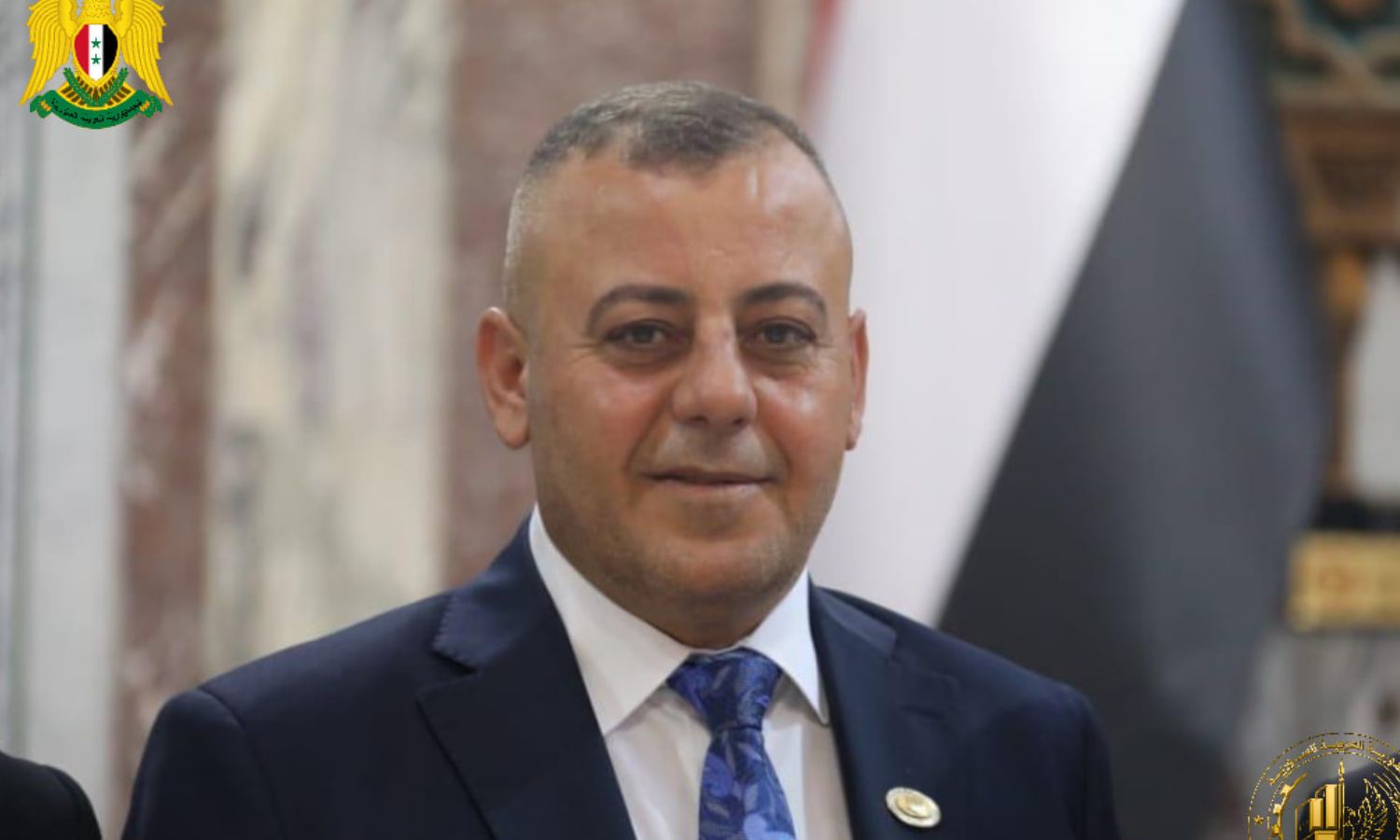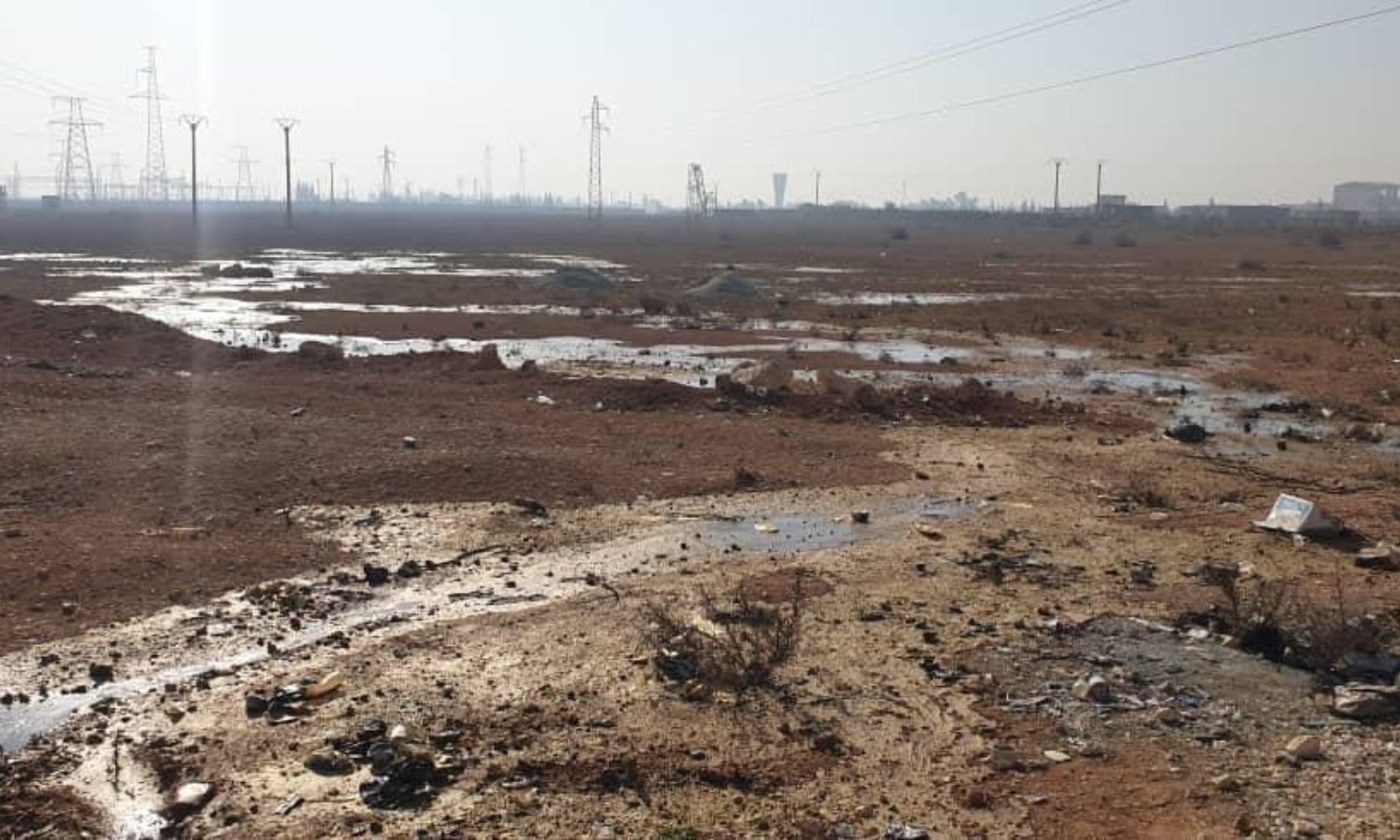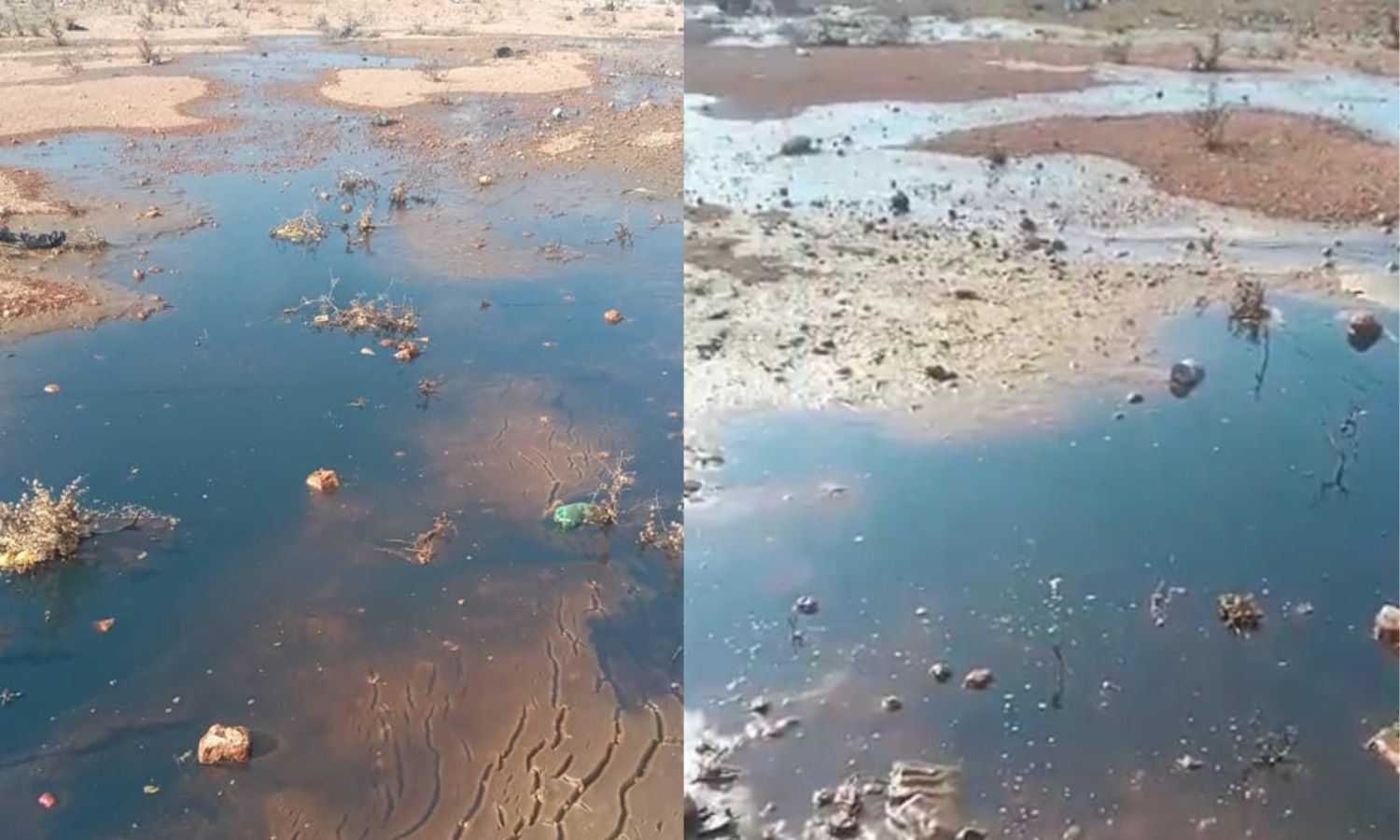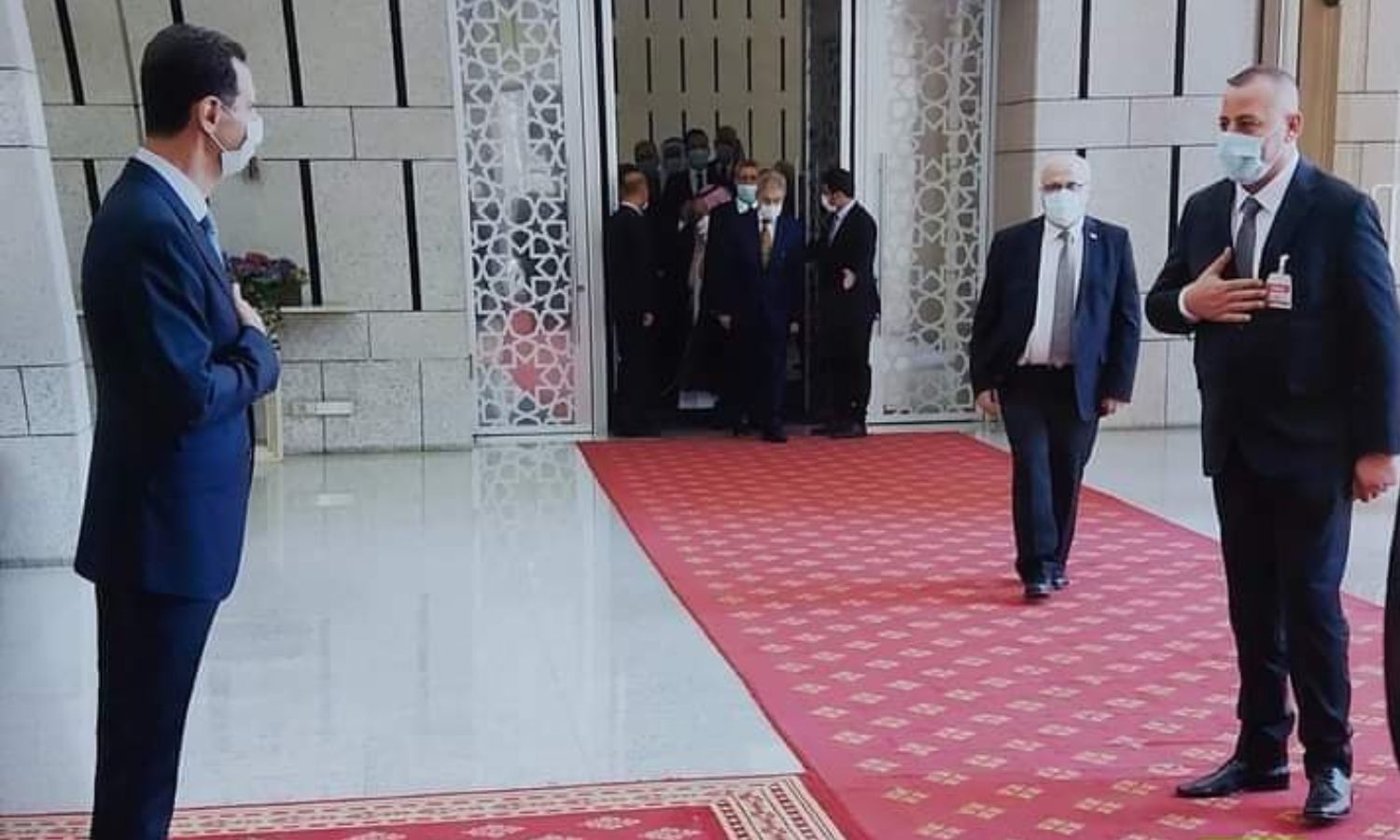



Enab Baladi – Hassan Ibrahim
The demands of the Ministry of Justice in the Syrian regime’s government continue to the People’s Assembly to grant permission for the judicial pursuit of several of its members, for committing crimes punishable by law, adding a new chapter to the “corruption of officials” file, in a country that tops the list of most corrupt countries.
The demands that have sparked wide controversy and are no longer confined to the rooms and seats of the People’s Assembly and the Ministry of Justice have reached the stages of approval for judicial prosecution against the member of the People’s Assembly Fouad Aldani, whose name is associated with violation cases and corruption files, primarily the waste of 300,000 liters of diesel in 2023.
On March 27, an unnamed source at the Ministry of Justice told Al-Baath newspaper (the mouthpiece of the ruling Baath Party in Syria) that the Minister of Justice, Ahmed al-Sayyed, had previously sent several letters to the People’s Assembly requesting permission for the judicial pursuit of a number of assembly members for committing legally punishable crimes.
The source mentioned that the People’s Assembly has yet to take any action regarding these members about granting prosecution permission, causing an obstruction of the judiciary’s work.
These demands have brought back the discussion of the waste of 300,000 liters of diesel in 2023. On January 17, 2023, the Minister of Justice sent a letter to the People’s Assembly president, Hammouda Sabbagh, requesting consideration of the possibility of granting permission for judicial prosecution against a member of the People’s Assembly in customs case number “1064”, related to smuggling a diesel cargo.
Local newspaper Al-Watan reported that the mentioned People’s Assembly member Fouad Aldani is accused of smuggling diesel and causing the waste of 300,000 liters of diesel in agricultural land to avoid customs pursuit. Quoting People’s Assembly sources, it could be possible for the assembly to consider the Minister of Justice’s letter and summon the accused member to hear his statements, upon which the appropriate legal and legislative measures against him would be taken.
A member of the People’s Assembly, Nasser al-Nasser, said on Thursday, March 28, that the absolute majority in the Assembly approved the request to grant permission for the judicial prosecution of People’s Assembly member Fouad Aldani for smuggling and corruption cases related to oil derivatives and other customs issues, not for lifting his immunity, but rather for a partial lift so he may stand before the judge.
He added on the local Sham FM radio station that 135 members of the People’s Assembly approved the permission, while 40 members, including himself, rejected it, pointing out that Aldani had previously been given a deadline to prove his innocence. At that time, the information he provided was that he does not own tanks with the capacity to hold 300,000 liters of diesel, and he has only one fuel station, in addition to suffering from a lack of supply.
Al-Nasser mentioned that lifting immunity occurs in cases of in flagrante delicto, such as “a traffic accident that resulted in a person’s death, intentional killing, or contraband involving the country’s security…”
He noted that the People’s Assembly members will file an electronic crime lawsuit against the pages that published false information about the suspension and lifting of immunity from 135 People’s Assembly members.
The case of wasting 300,000 liters of diesel dates back to January 2023 when the Syrian Ministry of Oil announced that the Customs Smuggling Control Directorate had captured a private fuel station in Aleppo that was tampering with and trading diesel through the presence of secret tanks with a capacity of 190,000 liters and tankers with a capacity of 136,000 liters.
The Ministry of Oil mentioned at the time that the seized material was estimated to be about 19,000 liters of diesel, and those responsible for the station disposed of 300,000 liters of diesel in nearby agricultural land before the arrival of customs and the committee by a few hours.
The incident caused widespread controversy and turned into a public opinion case because the fuel station belongs to People’s Assembly member Fouad Aldani, and the waste coincided with the worst fuel shortage crisis that impacted Syrians’ lives, affecting vital sectors and halting institutions and activities in various fields across the country.

Traces of 300,000 liters of wasted diesel on agricultural land near a fuel station owned by the member of the People’s Assembly Fouad Aldani – January 2023 (Syrian Ministry of Oil)
For a year, the case disappeared from media circulation scope, even within the corridors of the People’s Assembly, which held a meeting in January 2023 to listen to Fouad Aldani and refer the file to the Constitutional and Legislative Affairs Committee to study it and present its proposal to the People’s Assembly’s president on whether to lift the Aldani’s immunity or not.
On January 11, 2023, Syrian journalist Sohaib Masri said via Facebook that “a fine of 20 billion Syrian pounds was imposed on the diesel trader F.A after proving his involvement in several fuel smuggling cases, including the spilling of 300,000 liters of smuggled diesel into farmlands.”
He added that “no one is above the law, no matter the cover they hide behind, and the wheel of combating corruption for the leaders of gangs and smugglers is ongoing.”
Masri’s post gained traction on media outlets and social media pages, yet without any official decision or confirmation of any judicial action or fine imposition against the member of the People’s Assembly Fouad Aldani.

Traces of 300,000 liters of wasted diesel on agricultural land near a fuel station owned by the member of the People’s Assembly Fouad Aldani – January 2023 (Edited by Enab Baladi/ Syrian Ministry of Oil)
The member of the People’s Assembly Fouad Mohammad Subhi Aldani hails from the city of Binnish in eastern Idlib countryside, where he was born in 1977, holding his current position since 2020, and is the leader of a military group called “Assad’s Tigers”, part of the Tiger Forces/ Division 25 Special Forces in the Syrian regime forces, according to the Pro Justice organization.
Aldani joined the Tiger Forces early on with his group and participated in all their battles and his name was mentioned in the testimony of defector Afaq Ahmad about the massacre in Masaken Sayda in Daraa on April 29, 2011, which resulted in the killing of dozens of Syrians and arresting more than 100 demonstrators, including Hamza al-Khatib and Thamer al-Sharei who were killed by the Air Force Intelligence elements in Damascus, according to the organization.
According to the organization, Aldani participated in storming the cities of Douma, Darayya, and Talkalakh, and helped in recruiting informants for the Syrian regime in areas like Arbeen, Douma, Baniyas, and Talkalakh. He is complicit in all the crimes committed by the Tiger Forces in general and the Assad’s Tigers group in particular.
Aldani directly supervised the Wadi al-Azib crossing in rural Hama between the regime-controlled areas and the northern Syrian areas, with a daily income exceeding two million US dollars. He carried out large-scale falsifications and took possession of many properties between Aleppo and Idlib, through the force of Air Force Intelligence and Brigadier General Suhail Hassan, and coverage from Major General Jamil Hassan. He also engaged in smuggling operations of antiquities for the benefit of Major General Jamil Hassan, former director of the Air Force Intelligence.
Subsequently, Fouad Aldani founded Al-Fouad Industrial and Commercial Group from the money he “looted”, which he accumulated from tolls at crossings and seizing people’s properties, with support from Brigadier General Suhail Hassan, according to the Pro Justice organization. In addition, he executed extensive vote-rigging in some electoral boxes and buying voter votes, exploiting their needs and poverty at times, or by intimidating and threatening them with Air Force Intelligence at other times, according to the organization.

Member of the People’s Assembly in Syria Fouad Aldani and the Syrian regime president Bashar al-Assad (Fouad Aldani/Facebook)
The People’s Assembly in Syria is composed of 252 members who enjoy immunity throughout the term of the assembly. The People’s Assembly’s bylaws contain six articles related to the immunity of its members and the procedure for their legal pursuit in the event of committing crimes that are punishable by law, including Article “20”, which states: “Members of the People’s Assembly cannot be criminally or civilly liable for the facts they present, the opinions they express, or the votes they cast in public or secret sessions or committee work.”
Article “21” specifies four clauses:
According to Article “22”, an assembly member may not waive their immunity without permission from the People’s Assembly, and Article “23” states that a member may not be detained preventively without special permission from the assembly or its president outside its session periods (regular or extraordinary sessions within a single legislative term).
Article “24”, with due regard to the provisions of Article “21”, states that those affected and holders of personal rights retain the right to pursue the member in civil courts and to execute judgments issued with respect to these rights.
Article “25” of the assembly’s bylaws includes three clauses:
Article “26” states that if a member commits a crime on the People’s Assembly’s premises, the president may order their arrest or keep them under the supervision of the assembly’s guards until a decision is rendered on their case, and the president may deliver them to the judiciary and inform the People’s Assembly.
Corruption erodes more than two-thirds of the countries in the world, according to the 2022 report by Transparency International, in which Syria ranked second to last as the control of the Syrian regime over the state’s structures has led Syria to compete for the last places in the organization’s rankings of the most corrupt countries.
Syria occupied the last position in the list of the least corrupt countries, according to the classification of Global Risk for the year 2023, which specializes in risk management services.
According to the ranking issued on November 8, 2023, Syria is in the last place, 196th, among the ranked countries, after Yemen, South Sudan, Congo, and North Korea.
On December 9, 2023, corresponding to the 19th anniversary of the United Nations Convention against Corruption and to highlight the close link between combating corruption and peace, security, and development, the US Embassy in Syria stated that the latter is still classified as one of the most corrupt countries in the world.
Through its account on “X”, the US Embassy clarified that the economic contraction in Syria is due to management and corruption for which the Syrian regime is responsible, pointing out that one should not be deceived by the regime’s rhetoric.
if you think the article contain wrong information or you have additional details Send Correction